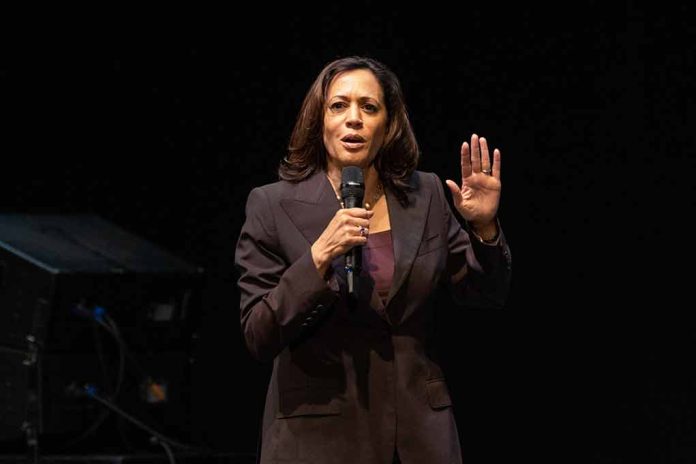
As election season heats up, Vice President Kamala Harris faces a plagiarism storm linked to her book “Smart on Crime,” leaving political ramifications hanging in the balance.
At a Glance
- Conservative analyst Christopher Rufo claimed Harris plagiarized sections of “Smart on Crime.”
- The book allegedly contains unquoted portions from sources like Wikipedia and formal reports.
- The controversy has prompted her publisher to handle it with sensitivity.
- Past similar allegations have affected political careers, as seen in Biden’s early challenges.
Allegations and Evidence
Conservative activist Christopher Rufo accused Vice President Kamala Harris of lifting approximately 500 words from various sources for her 2009 book “Smart on Crime.” The accusations surfaced as Rufo published claims that included screenshots highlighting content from formal reports, academic studies, and a Wikipedia article, which were reportedly incorporated into the book without quotes. In response, Harris’ team dismissed these claims as politically motivated attacks. Rufo, however, insists that the overlap between Harris’ text and the cited sources is undeniable.
The New York Times evaluated the book rigorously and concluded that these alleged infractions revolved around misquoted statistical information, not the theft of unique ideas. Plagiarism consultant Jonathan Bailey labeled these claims as “errors,” arguing against Rufo’s interpretation of their severity, and accused him of inflating relatively minor citation errors.
Publisher’s Reaction
Chronicle Books, the publisher of “Smart on Crime,” has refrained from an immediate public comment. Internal communication reveals a cautious approach, with senior marketing executive Lauren Hoffman instructing staff to channel inquiries to her office. Screenshot leaks of these messages suggest the publisher’s heightened scrutiny over the sensitive matter, engaging senior executives to address potential reputational damage. “Oh gosh,” Joan O’C. Hamilton told The Post on a brief phone call. “I haven’t seen anything. … I’m afraid I can’t talk to you right now, though, I’m in the middle of something. Let me go try to figure that out.”
Meanwhile, Harris’ campaign defends the book by asserting the presence of both footnotes and endnotes, though acknowledging certain oversights. Joan O’C. Hamilton, recognized as Harris’ ghostwriter, seemed stunned by these developments and declined immediate comment, indicating an ongoing investigation into the matter.
THREAD: Report from Christopher Rufo: Vice President Kamala Harris's plagarism scandal.
She reportedly plagarized several sections of her book "Smart on Crime" from 2009.
Check them out. Most colleges and universities would expel a student for this level of plagiarism. https://t.co/hrnTyY1Ady
— Caleb Parke (@calebparke) October 14, 2024
Political Implications
The allegations arrive at a critical juncture, raising questions about their potential consequences on Harris’ political future, particularly in light of similar claims that previously challenged President Biden. The comparison invites speculation about the impact on Harris, especially with voters who prioritize authenticity and probity in political figures. The affair unfolds against a backdrop of academic debates where concerns about intellectual rigor and originality have become increasingly prominent. “This amount of plagiarism amounts to an error and not an intent to defraud,” he said, adding that Mr. Rufo had taken relatively minor citation mistakes in a large amount of text and tried to “make a big deal of it.”
As the narrative develops, Harris’ camp maintains that the issues are rooted in citation errors rather than willful deceit, a stance bolstered by defenders who view Rufo’s allegations as exaggerated. Nevertheless, the political and electoral stakes remain high as all parties brace for potential fallout.







